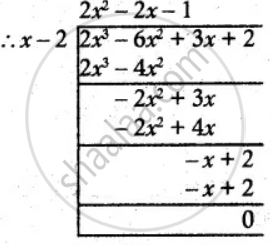Advertisements
Advertisements
प्रश्न
Determine k and solve the equation 2x3 – 6x2 + 3x + k = 0 if one of its roots is twice the sum of the other two roots
उत्तर
Given cubic equation
2x3 – 6x2 + 3x + k = 0
Let the roots be α, β, γ
Given α = 2(β + γ)
β + γ = `alpha/2` .......(1)
Sum of roots α(β + γ) = 3
From (1) `alpha + alpha/2` = 3
`(3alpha)/2` = 3
⇒ α = 2
Again αβ + βγ + γα = `3/2`
α = 2
⇒ 2β + βγ + 2γ = `3/2`
From (1) `2(alpha/2) + betaγ = 3/2`
βγ = `3/2 - 2`
= `(3 - 4)/2`
= `(-1)/2`
βγ = `(-1)/2` ........(2)
Product of roots α β γ = `- "k"/2`
α = 2
⇒ 2βγ = `- "k"/2`
βγ = `- "k"/4` .......(3)
From (2) and (3)
`- "k"/4 = (- 1)/2`
k = `4/2` = 2
k = 2
Also α = 2
⇒ x – 2 is a factor

Other factor `2x^2 - 2x - 1` = 0
x = `(2 +- sqrt(4 + 8))/4`
= `(2 +- 2sqrt(3))/4`
= `(2(1 +- sqrt(3)))/4`
= `(1 +- sqrt(3))/2`
∴ The roots are 2, `(1 + sqrt(3))/2, (1 - sqrt(3))/2`
APPEARS IN
संबंधित प्रश्न
Solve the cubic equation: 2x3 – x2 – 18x + 9 = 0 if sum of two of its roots vanishes
Solve the equation 9x3 – 36x2 + 44x – 16 = 0 if the roots form an arithmetic progression
Solve the equation 3x3 – 26x2 + 52x – 24 = 0 if its roots form a geometric progression
Find all zeros of the polynomial x6 – 3x5 – 5x4 + 22x3 – 39x2 – 39x + 135, if it is known that 1 + 2i and `sqrt(3)` are two of its zeros
Solve the cubic equations:
2x3 – 9x2 + 10x = 3
Solve the cubic equations:
8x3 – 2x2 – 7x + 3 = 0
Solve: (x – 5)(x – 7) (x + 6)(x + 4) = 504
Solve: (x – 4)(x – 2)(x- 7)(x + 1) = 16
Solve: (2x – 1)(x + 3)(x – 2)(2x + 3) + 20 = 0
Choose the correct alternative:
If α, β and γ are the zeros of x3 + px2 + qx + r, then `sum 1/alpha` is
Choose the correct alternative:
The polynomial x3 – kx2 + 9x has three real roots if and only if, k satisfies
Choose the correct alternative:
If x3 + 12x2 + 10ax + 1999 definitely has a positive zero, if and only if
Choose the correct alternative:
The polynomial x3 + 2x + 3 has
Choose the correct alternative:
The number of positive roots of the polynomials `sum_("j" = 0)^"n" ""^"n""C"_"r" (- 1)^"r" x^"r"` is
